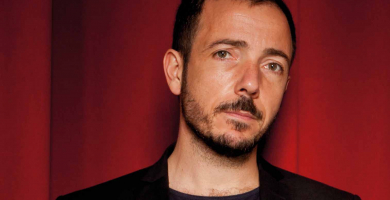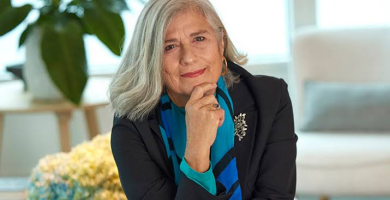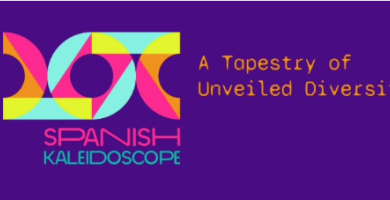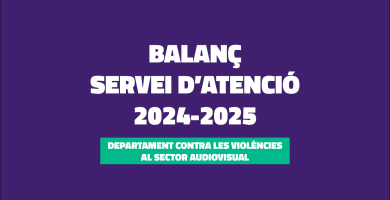
Jaume Ripoll: "The key to Filmin is that it is like a mosaic, we bring together different pieces of audiovisual tastes."
This month we interview Jaume Ripoll, co-founder of Filmin. The online streaming platform has a catalogue of 14,000 titles of films and series. We talk to him about Filmin, about the online editions of festivals because of COVID-19, the Atlàntida Fest and about many other things.

It is 10 years since your first subscription. How and why was Filmin established? What were your goals when you created the platform?
The idea arose in 2006, the company in 2007 and the platform in 2008. It was a process of almost 24 months before it was launched. The first subscription arrived in 2010, which is what we are now celebrating.
The founders of the platform José Antonio de Luna, Juan Carlos Tous and me thought that part of the future of audiovisual consumption had to involve the Internet and that this meant that if we, I mean the people who were working on independent films in our country, wanted to have a voice in this future they had to create their own platform before the foreseeable arrival of other big companies. Neither Netflix nor Apple existed at that time, but we could anticipate that this would occur. We then decided to create the company. It was established at the heart of the DVD distributor Cameo. However, we decided that it would not be called Cameo, but rather Filmin, and we incorporated other distributors into the shareholding which are not in Cameo in order to broaden the base. There would not only be titles from this distributor but also from other people who were not members in order to be able to offer as broad a catalogue as possible.
What happened? From the idea to reality, we had to overcome technical, rights and business obstacles. And these three obstacles are those which made us suffer or work over those years until 2010.
Filmin was the first online film and series platform in Spain. The audiovisual panorama has changed a lot, above all with the arrival of more platforms, but you are still here. What distinguishes you from other platforms?
Filmin has something differential. On the one hand, thanks to the content that it has, I would say that 90% is exclusive. The type of films and series that we premiere and the connection with the territory are also important. It is like a local platform which understands and supports young Catalan and Spanish filmmakers and which works with the country’s universities and institutions, with festivals such as DA, Docs, the Women’s Film Festival and others. This makes us different; it gives us a certain personality. There is a series of subscribers, fortunately more and more, who understand or enjoy this proposal. There will be people who prefer films or series, some will love them and others not so much, but that is what it’s like. It’s like when you go to the market and there is one shopkeeper who knows your tastes, understands them and recommends this which is good and you trust them. There is this idea of trust and complicity which is what we work on with the subscribers.
What content from your catalogue do you believe works the best?
It’s an accumulation; some people will tell you that it’s series like The Virtues or Inside No. 9, others that it’s the classic films from Metro Goldwyn Mayer, Universal or the European classics, ... I believe that there are different types of audiences and each enjoys one part. The key to Filmin is that it is like a mosaic, we bring together different pieces of audiovisual tastes.
Right from the beginning you have had agreements with different festivals in order to offer part of their programme on line. How did this festival-oriented approach and this intention to work with them arise?
Filmin has collaborated with festivals for many years and indeed we have our own, the Atlàntida Fest. This year is also the 10th anniversary. We were already working with Docs Barcelona; we had a small online section on the platform. What has been done differently this year? Well, there was no possibility of holding a physical edition of festivals like Docs, DA or the Women’s Film Festival. In this case, we put our entire team at the disposal of the festival.
At the beginning they approached us. It was very easy and smooth. We all won. Them, because they were able to hold their editions, and festivals which were maybe attached to the territory obtained national visibility. The creators won because they were able to market works and give them visibility when maybe they would not have had so much. The distributors, because they obtained an economic return which they would not have had. And it is undoubtedly the audiences which won the most, because they have all these festivals for a very low price, represented by the Filmin subscription.
Do you think that there will be continuity, that more festivals will be encouraged to have online programmes?
Yes, we have announced the Huelva festival which will take place in November. We have the German film festival and the Korean festival in June, the LGBTIQ Film Festival of Asturias in the Oscar Niemeyer International Cultural Centre which begins at the end of June, Skyline Fest of Benidorm in July. We have a very busy calendar of events.
You also created the Atlàntida Fest which, as you mentioned, is celebrating its 10th anniversary. Why did the need to have your own festival arise?
It was established 10 years ago when there were no online festivals. It was the first online festival to be created in the country. There was a very clear need to focus on films which would not have visibility without the festival, either through the media or through the users. In a way they would have this patina of prestige which comes from being in a festival. Afterwards, it may have a relative or a significant impact on the audiences but, in any case, it was important for it to exist and even more so 10 years ago when the Internet did not have the prestige that it may have now.
Five years ago, when we decided to go to Mallorca, the decision was made because we also backed what is physical, face-to-face. And we believe that it is fantastic if it can be done, to combine both formats. The resounding success of Mallorca and the exponential increase in audiences each year, encouraged us to implement such an ambitious idea as a mixed festival between Mallorca and online. The Atlàntida has premiered films before they reach cinemas, such as Alain Guiraudie’s Stranger by the Lake, Stories We Tell by Sarah Polley and Alps by Yorgos Lanthimos, among others. We are talking about world-class level films. In this country we have not been able to enjoy this content with very limited access.
You have always supported young creators and also more local content, for example also with Filmin.cat which is platform to support films made here. Is that why Filmin.cat was created?
It was also established with a collaboration agreement with ICEC and the Regional Ministry of Culture which, at the time, was headed by Santi Vila. There was a very clear vocation or will to offer institutional support to a fully Catalan platform, not just because of the language but also the curatorship. That is to say that there is editorial work behind it, programming, selecting, approaching Catalan talent and festivals which maybe, in view of their size, cannot reach the whole of Spain, but which can succeed in the territory of Catalonia. This also obviously entails support for young talent. In Fimin.cat we have done this by premiering shorts or feature films and, of course, working side-by-side with Catalan films because this is an essential element for us.
With this pandemic, has the consumption of your platform by users changed or have the devices with which people see your catalogue changed?
Not any more. Because with the easing of lockdown and being able to go out, to go to terraces and to see friends, although with social distancing, people are going out more. However, in the beginning, especially in March and April, an exponential increase in the number of viewings and of subscribers was noted, but with less intensity. As regards devices, we have noted and it was obvious that mobiles lost weight compared with tablets. Televisions and computers continue to be the same. People mainly see Filmin on the television, followed by the computer and lastly tablets and mobiles. Mobiles have gone up again, a sign that there are people who are moving again.
As for the criterion of what they saw, it is true that at the beginning of March and the end of February we noted more people who were seeing things about pandemics, viruses and catastrophes: Utopia, Phase 7, Take Shelter, The Road... However, I believe that, as the pandemic gradually became more serious and they realized that it was no joke, when fiction became real, the great majority of our audiences fled this type of fiction and went on to another. They sought escapism or something else.
What has this pandemic meant for you? On a technological level, for example.
We had to invest in our servers, to reinforce the entire streaming capacity, we have increased the team, we have more people working. We have hired another three people over these months. It has not been easy. We have also changed our computers and we are all teleworking. We are talking about a company with 30 people and it is not easy because it has already been three months, far from each other, and there are things which suffer whether you want it or not. However much we use Zoom. Teleworking has marvellous things and also shortcomings.
You don’t only offer already released online content but also sometimes simultaneous cinema releases, exclusive series releases, you have now created The Filmin Times, ordering films by recent historical events of Europe. How did this last idea arise and is it always necessary to innovate and to offer new things in order to attract the audience?
For me personally, The Filmin Times is one of the projects which have excited me the most in the last few years. I really appreciate it. It’s true that it arose at a difficult time because we have not been able to disseminate all the training part for students like we would have without the pandemic. In any case, it is a really nice project. It’s an initiative which allows us to innovate, to talk about the things which interest us, about the history of film, about the history of Europe, to try to recommend in a different way. The Filmin Times has a very clear goal, which is to make a different recommendation to the one that is usually made. It is a really nice project which is doing well and we hope that, with a view to September, it can take another step, with more students and more teachers who can use it. We believe that it is an extremely powerful training tool, and I am sure that there is nothing like it in the whole of Europe.
How does the management of rights and broadcasting licences operate depending on the countries? For example, you have Filmin Latino which doesn’t offer the same content as here. Is that right?
The rights are territorial, country by country in this case. The management of rights by countries is complicated and complex. It is not easy to do it. Here we have 14,000 films and series and it is very difficult to try to clone that. In Portugal we have 2,000. There the company is part of Filmin, shall we say, but not in Mexico. The management and governance belong to the Mexican government. Our brand is there, but we do not control it. And it is more geared toward disseminating Mexican than European films. It’s true that we would like to have more titles in Portugal or in other territories, but it is so difficult and so costly that we believe that it is better to focus on one territory and to become big or at least not shrink to then be able to go to another territory.
How does the question of subtitles and dubbing in different languages work? Is this an issue that you look after or do they already come like that from the distributor? Because there are films which have different options.
In many cases the distributors offer us the subtitles or the dubbing, if there is any. Others are films which we maybe incorporated exclusively or which have not been released in our territory and in this case we do the subtitling in Spanish and occasionally in Catalan, if we consider it to be convenient. We dub the series, but we dub films less because the cost is very high.
With the 35 mm classics for which digitized copies are needed, are they remastered in order to be able to maintain the quality?
The masters from 12 years ago that we have and that we have not been able to replace due to equipment constraints are worse, more limited. But the copies which we have gradually acquired over recent years are impeccable and they will be better and better. Very important work is being carried out internationally on the remastering of classics.
What are your future plans?
In July we will release what for me is the best series of the year, The Collapse (L’Effondrement), which is a French series in eight episodes which are eight sequence shots. It is an absolute premiere in our territory. We have redesigned our website and we are preparing the Atlàntida Fest which will be held from 27 July to 2 August in Palma and from 27 July to 27 August on Filmin.
Can you give us a personal recommendation of some content which we absolutely must see, or is it very difficult to choose?
It depends on the viewer and on your mood at the time. We have just released two remastered films by Nanni Moretti, April and The Son’s Room. The latter leaves you shattered but April is a funny and human film. I recovered it quite recently and it is so good and enjoyable to watch. It is a pleasure to see the classic Moretti again.









